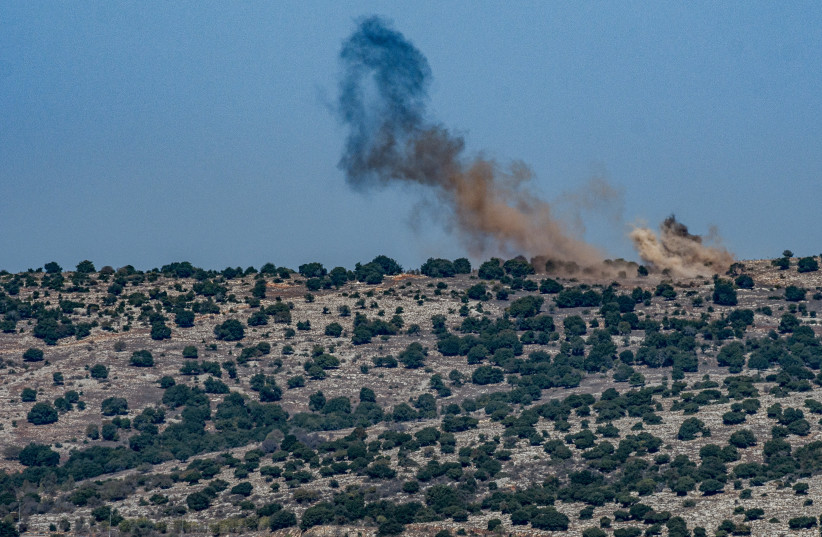Has the great Hezbollah war question been answered? – analysis
One of the greatest questions of this war has been would Israel face two full-fledged fronts, including not only the South with Hamas, but also the North with Hezbollah.
This question deepened when already early on in the war, Hezbollah escalated its attacks on Israel to the worst they have been since the 2006 Second Lebanon War.
This was no mere symbolic rocket fire once or twice, but constant daily operations against Israel, including larger rocket fire, farther rocket fire, constant anti-tank missiles, systematically disabling Israeli border censors with gunfire, and numerous attempts to carry out small scale penetrations/invasions into Israel.
A number of Israeli soldiers have been killed or wounded.
According to some counts, Hezbollah has lost around 50 of its own fighters/terrorists in fighting with the IDF and otherwise.

The attacks forced Israel to evacuate not only metullah, right on the Lebanese border, but eventually also all towns within two kilometers of the border, then within five kilometers, then even the city of Kiryat Shmona.
The more than 125,000 Israeli nationally evacuated from their homes includes not only Israelis from the South near Gaza, but tens of thousands from the North due to Hezbollah’s actions.
All of this might incorrectly lead people to say that Hezbollah did enter the win fully and Jerusalem is fighting fully on two fronts.
Ground incursion begins
Now that the ground invasion is in its fourth or fifth day – depending on whether you count from the initial smaller forays into Gaza versus the larger ones on friday and Saturday, we can either conclude or start to conclude that Hezbollah Chief Hassan Nasrallah has decided to broadly stay out.
Israeli fears of Hezbollah joining the war were so strong, that large numbers of the 360,000 reservists were not sent just to the South and the West Bank, but also to the North.
Not a single Hezbbollah attempted penetration has gotten anywhere, even with the terror group having successfully disabled many of Israel’s censors, because the northern border is teeming with IDF reinforcements in every spot.
The delay of the large ground invasion itself for at least one of the weeks was largely to give time to further reinforce the North so that Hezbollah would have no capability to penetrate once Israel invaded the South.
But Hezbollah still could have unleashed its full rocket arsenal on all of Israel.
It could be attacking Jerusalem, Tel Aviv, the center, along with much more of the North, including Haifa, all at once.
It could be firing not dozens of rockets at a time, but 6,000 to 8,000 per day, dwarfing Hamas’ record of around 2,000 on the first day of the war, and it’s closer to 50-200 rockets on many days since then.
Hezbollah could be using its precision rockets, which Hamas does not have, to target IDF headquarters in Tel Aviv, Ben Gurion Airport, and other key army bases and business and infrastructure centers around the country.
The IDF has a four tiered missile defense which goes beyond Iron Dome to shoot down some of these more advanced rockets, but predictions over the years were that it would not be able to shoot down all of them.
Even with a 90% success rate, 10% of 150,000 rockets getting through would have devastated Israel in a different way than even what Hamas did on October 7.
We have not seen any of this even into the fourth or fifth day of the ground invasion, despite Hamas’ fate clearly going more into jeopardy.
In fact, reports indicate that Hezbollah supporters are slamming Hamas officials, like Khaled Mashaal, who are talking too loudly about Hezbollah doing more than they are doing.
Hezbollah wants to present that they have been fighting every day of the war, which they have, not that they are holding back 95% of their capabilities to avoid a massive Israeli counter-assault.
Some of them are calling Mashaal irrelevant, and bringing up old wounds, like that Hamas sided with Sunni rebels in Syria, instead of with Hezbollah and the Assad regime during the Syrian Civil War that covered much of the 2010s.
Mashaal made it clear that Hezbollah is just fighting side battles and is holding back and the Lebanese terror group jumped on him to get this rhetoric out of the public sphere.
Could this change at any moment?
Could Hezbollah decide once Israel may kill or capture Hamas leaders Yahya Sinwar and Mohammed Deif or some other turning point which truly signals the fall of Hamas, that they must intervene in a more dangerous way?
Of course, but slowly but surely its inaction with its largest capabilities, as opposed to the still dangerous but limited regular border fighting, are making the case that Israel will not have to fight two full scale wars on two fronts.
If so, this would validate at least one week of delay (not all three weeks) to position more forces in the North as well as Israel’s high coordination with the US to bring a clearer American military threat on Hezbollah should they decide to cross certain lines.





Comments are closed.